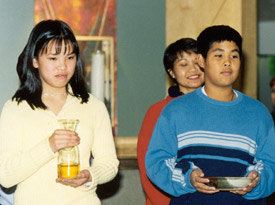 We understand and acknowledge that becoming Catholic isn’t just a one-time event that happens at a person’s Baptism. It is a whole lifetime of learning how to live in a way that reflects the message of Christ and the Scriptures and the teaching and tradition of the Catholic Church. In a sense, we are becoming Catholic every day because we are always striving to understand how Christ would have us respond to the daily events of our lives. Each day, through all the stages and circumstances of our lives, we try to deepen our faith and grow in our likeness of Christ.
We understand and acknowledge that becoming Catholic isn’t just a one-time event that happens at a person’s Baptism. It is a whole lifetime of learning how to live in a way that reflects the message of Christ and the Scriptures and the teaching and tradition of the Catholic Church. In a sense, we are becoming Catholic every day because we are always striving to understand how Christ would have us respond to the daily events of our lives. Each day, through all the stages and circumstances of our lives, we try to deepen our faith and grow in our likeness of Christ.
The way we learn how to do this is through prayer: with other Catholics in a parish community, with our families at home, and by ourselves through daily practices of faith. Prayer teaches us our faith, strengthens our belief, and stirs us to live it in concrete ways every day. Prayer must always lead to action; the action we take—the way we live each day of our lives—is our spirituality. So whether you’re 7, 17, 47, or 97, a brand new Catholic or a life-long believer, we are always trying to grow deeper in our Catholic faith.
Prayer & Sacraments
“The liturgical life of the Church revolves around the seven sacraments, with central emphasis on the Eucharist. Fundamental principles apply to catechesis for each of the sacraments. Catechesis for a sacrament should:
- Present a comprehensive and systematic formation in the faith, one that integrates knowledge of the faith with living the faith
- Center on initiation into the life of the Triune God, and present Christian life as a lifelong journey
- Be appropriate to the age level, maturity, circumstances, language, and ethnic background of those being catechized
- Be directed to all members of the Christian community, and be offered within and through the whole community of faith
- Involve parents in the formation of their children
- Be integrated into the total catechetical program
- Focus primarily on the symbols, rituals, and prayers contained in the rite for each sacrament
- Enable the believer to reflect on the meaning of the sacrament received by implementing a thorough experience of mystagogia following the celebration”
National Directory for Catechesis, United States Conference of Catholic Bishops, #35 B., pages 113-114.
Los Sacramentos como misterios
La vida litúrgica de la Iglesia gira en torno a los sacramentos, con la Eucaristía como centro. Los sacramentos son signos eficaces de la gracia, instituidos por Cristo y confiados a la Iglesia por los cuales nos es dispensada la vida divina. Algunos principios fundamentales se aplican a la catequesis para cada uno de los sacramentos.
La catequesis sacramental debe presentar lo siguiente:
- Una formación completa y sistemática en la fe, una que integre el conocimiento de la fe con la experiencia de vivir la fe.
- Sea fundamentalmente trinitaria y se centre en la iniciación en la vida del Dios Trino.
- Sea apropiada para la edad, la madurez, circunstancias, el idioma y el origen étnico de los que están siendo catequizados.
- Sea destinada a todos los miembros de la comunidad cristiana, se desarrolle en la comunidad e involucre a toda la comunidad de fe
- Involucre a los padres de familia en la preparación de sus hijos a los sacramentos
- Que los padres de familia se integren al programa de catequesis totalmente
- Concentrarse principalmente en los símbolos, rituales y oraciones contendidos en el rito de cada sacramento
- Permitir que el creyente reflexione sobre el significado del sacramento recibido, mediante la implementación de una profunda experiencia de mistagogia después de la celebración.
Directorio Nacional para la Catequesis, Conferencia de los Obispos Católicos de los Estados Unidos, 2005, # 35 B, páginas 125-126.
